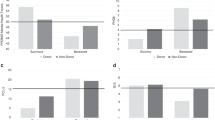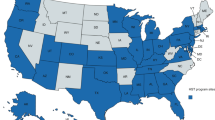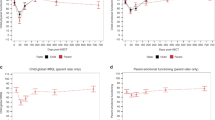Abstract
This study examined the course of adaptation as indicated by the level of emotional distress for family caregivers of adult BM recipients across the acute phase of the transplant trajectory. Factors influencing caregivers’ adaptation that could be potential markers of vulnerability to psychological and social morbidity were identified. The sample included 192 caregivers of either an autologous or allogeneic BMT recipient. Data were collected by self-report questionnaires at three time points in the trajectory: pre-transplant/pre-hospitalization (T1); during hospitalization, post-infusion (T2); 1 month post-discharge (T3). There was a decline in emotional distress from T1 to T3, and bivariate correlations indicated significant association of distress with variables hypothesized to be theoretically relevant. Specifically, greater personal control, a greater sense of spiritual connectedness, less disruption in the life of the caregiver and less use of avoidance coping were the strongest factors associated with lower emotional distress. In conclusion (1) levels of personal control and spirituality remained stable across time and were negatively associated with emotional distress. Therefore, they may provide an indication of caregiver resilience pre-transplant; (2) level of recipient symptomatology rather than BMT type appears to influence caregiver distress; (3) there are indications of the need for post-hospitalization follow-up with caregivers by the BMT team.
This is a preview of subscription content, access via your institution
Access options
Subscribe to this journal
Receive 12 print issues and online access
$259.00 per year
only $21.58 per issue
Buy this article
- Purchase on Springer Link
- Instant access to full article PDF
Prices may be subject to local taxes which are calculated during checkout

Similar content being viewed by others
References
Aneshensel CS, Botticello AL, Yamamoto-Mitani N . When caregiving ends: the course of depressive symptoms after bereavement. J Health Soc Behav 2004; 45: 422–440.
Foxall MJ, Gaston-Johansson F . Burden and health outcomes of family caregivers of hospitalized bone marrow transplant patients. J Adv Nurs 1996; 24: 915–923.
Grimm P, Zawacki KL, Mock V, Krum S, Frink BB . Caregiver responses and needs: an ambulatory bone marrow transplant model. Cancer Practice 2000; 8: 120–128.
Syrjala KL, Chapko MK, Vitaliano PP . Recovery after allogenic transplantation: prospective study of long-term physical and psychosocial functioning. Bone Marrow Transplant 1993; 11: 319–327.
Langer S, Abrams J, Syrjala K . Caregiver and patient marital satisfaction and affect following hematopoietic stem cell transplantation: a prospective longitudinal investigation. Psycho-Oncol 2003; 12: 239–253.
Bishop MM, Beaumont JL, Hahn EA . Late effects of cancer and hematopoietic stem-cell transplantation on spouses or partners compared with survivors and survivor-matched controls. J Clin Oncol 2007; 25: 1403–1411.
Molassiotis A, Morris PJ . Suicide and suicidal ideation after bone marrow transplantation. Bone Marrow Transplant 1997; 19: 87–90.
Boyle D, Blodgett L, Gnesdiloff S, White J, Bamford AM, Sheridan M et al. Caregiver quality of life after autologous bone marrow transplantation. Cancer Nurs 2000; 23: 193–203.
Siston AK, List MA, Daugherty CK, Banik DM, Menke C, Cornetta K et al. Psychosocial adjustment of patients and caregivers prior to allogeneic bone marrow transplantation. Bone Marrow Transplant 2001; 27: 1181–1188.
Christakis NA, Allison PD . Mortality after the hospitalization of a spouse. N Engl J Med 2006; 354: 719–730.
Cook WL, Kenny DA . The actor-partner interdependence model: a model of bi-directional effects in developmental studies. Int J Behav Dev 2005; 29: 101–109.
Minuchin P, Minuchin S . The family as the context for patient care. In: Bernstein LH, Grieco AJ, Dete M (eds). Primary Care in the Home. Philadelphia: Lippincott, 1987, pp 83–94.
Simon RW . The meanings individuals attach to role identities and their implications for mental health. J Health Soc Behav 1997; 38: 256–274.
Pearlin LI, Aneshensel CS, LeBlanc AJ . The forms and mechanisms of stress proliferation: the case of AIDS caregivers. J Health Soc Behav 1997; 38: 223–236.
Stetz KM, McDonald JC, Compton K . Needs and experiences of family caregivers during bone marrow transplantation. Oncol Nurs Forum 1996; 23: 1422–1427.
Compton K, McDonald JC, Stetz KM . Understanding the caring relationship during bone marrow transplantation: family caregivers and healthcare professionals. Oncol Nurs Forum 1996; 23: 1428–1432.
Eldredge DH, Nail LM, Maxiarz RT, Hanssen LK, Ewing D, Archbold PG . Explaining family caregiver role strain following autologous blood and marrow transplantation. J Psychsoc Oncol 2006; 24: 53–74.
Bishop MM, Beaumont JL, Hahn EA, Cella D, Andrykowski MA, Brady MJ . Late effects of cancer and hematopoietic stem-cell transplantation on spouses or partners compared with survivors and survivor-matched controls. J Clin Oncol 2007; 25: 1403–1411.
Keogh F, O’Riordan J, McNamara C, Duggan C, McCann SR . Psychosocial adaptation of patients and families following bone marrow transplantation: a prospective longitudinal study. Bone Marrow Transplant 1998; 22: 905–911.
Zabora JR, Smith ED, Baker F, Wingard JP, Curbow B . The family: the other side of bone marrow transplantation. J Psychsoc Oncol 1992; 10: 35–46.
Fife BL, Huster GA, Cornetta KG, Akard LP, Broun ER . Longitudinal study of adaptation to the stress of bone marrow transplantation. J Clin Oncol 2000; 18: 1539–1549.
Watson D, Clark LA . Manual for the Positive and Negative Affect Schedule—Expanded Form The PANAS-X. The University of Iowa, 1994.
Bakas T, Champion V . Development and psychometric testing of the Bakas Caregiving Outcomes Scale. Nurs Research 1999; 48: 250–259.
Lazarus R, Folkman S . Stress, Appraisal, and Coping. New York, NY: Springer 1984.
Pearlin LI, Leiberman MA, Menaghan EG, Mullan JT . The stress process. J Health Soc Behav 1981; 22: 337–356.
Peterman AH, Fitchett G, Brady MJ, Hernandez L, Cella D . Measuring spiritual well-being in people with cancer: the functional assessment of chronic illness therapy—Spiritual well-Being Scale (FACIT-Sp). Ann Behav Med 2002; 24: 49–58.
Fife BL, Kennedy VN, Robinson L . Gender and adjustment to cancer: clinical implications. J Psychosoc 1994; 12: 1–21.
Spanier GB . Measuring dyadic adjustment: new scales for assessing the quality of marriage and similar dyads. J Marriage and Family 1976; 38: 15–28.
Rubin DB . Multiple imputation after 18+ years. J Am Stat Assoc 1996; 91: 473–489.
Acknowledgements
We thank the American Cancer Society for the grant that made this study possible (RSGB-05-012-01-CPPB). Thank you to Sherif Farag, MD, Medical Director of the Bone Marrow and Stem Cell Transplant Program of the Indiana University Cancer Center for his support. Thank you to Mohammad Temkit, MA, for his assistance with the data analysis, and to project managers, Jennifer Davis, RN, Connie Krier and Linda Scott, MS, for their meticulous attention to detail. We greatly appreciate the time taken by caregiver participants to share their experiences with us.
Author information
Authors and Affiliations
Corresponding author
Rights and permissions
About this article
Cite this article
Fife, B., Monahan, P., Abonour, R. et al. Adaptation of family caregivers during the acute phase of adult BMT. Bone Marrow Transplant 43, 959–966 (2009). https://doi.org/10.1038/bmt.2008.405
Received:
Revised:
Accepted:
Published:
Issue Date:
DOI: https://doi.org/10.1038/bmt.2008.405
Keywords
This article is cited by
-
Effect of family cohesion on symptom distress during hematopoietic stem cell transplantation
Supportive Care in Cancer (2022)
-
Quality of life and mood of older patients with acute myeloid leukemia (AML) receiving intensive and non-intensive chemotherapy
Leukemia (2019)
-
Correlates of anxiety and depression symptoms among patients and their family caregivers prior to allogeneic hematopoietic cell transplant for hematological malignancies
Supportive Care in Cancer (2019)
-
Effects of Social Support Source and Effectiveness on Stress Buffering After Stem Cell Transplant
International Journal of Behavioral Medicine (2019)
-
Long-term implications of autologous HCT for caregiver quality of life: how does the survivor’s health matter?
Supportive Care in Cancer (2019)



